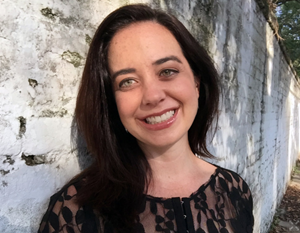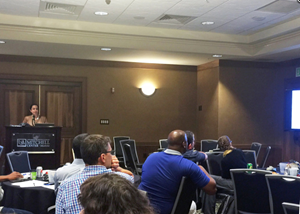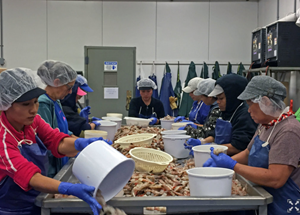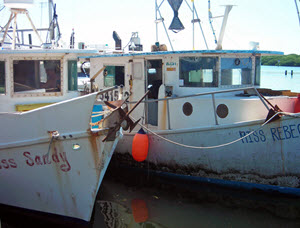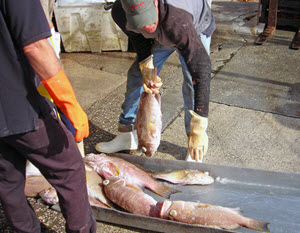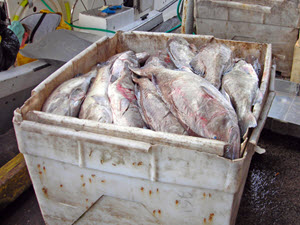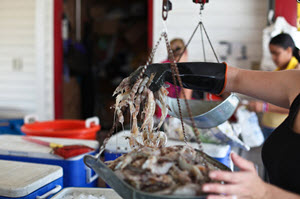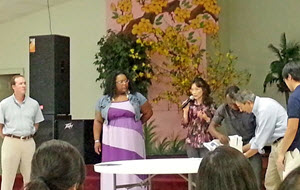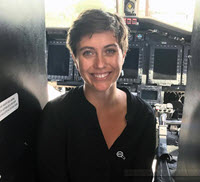
Vanessa inside a helicopter at a heliport in Cut Off, LA, where offshore oil workers commute to and from work. (Provided by Vanessa Parks)
A person’s socioeconomic position can influence their health and well-being, and disasters can place additional strain on those whose health and well-being are already compromised.
Vanessa Parks compiles and analyzes data on Gulf Coast communities that explores how the Deepwater Horizon oil spill affected mental and physical health and how social factors contributed to post-disaster health outcomes. “I am interested in what contributes to better health outcomes, because I want to help reduce health inequalities and inequities,” Vanessa said. “If residents have access to better economic resources and health care, they are better prepared for the traumatic impacts of disasters.”
Vanessa is a Ph.D. student in Louisiana State University’s sociology program and a GoMRI Scholar with the Consortium for Resilient Gulf Communities (CRGC).
Her Path
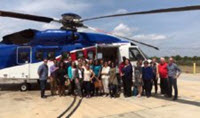
RGC group photo at the Cut Off, LA, heliport. (Provided by Vanessa Parks)
Growing up, Vanessa was acutely aware of the public health concerns facing her hometown of Memphis, including high obesity rates, teen pregnancy, and HIV infection. However, those concerns rarely affected her affluent and largely white suburb. She first encountered the interrelationship between socioeconomic position and health working as a part-time clerk at a bankruptcy law firm while attending the University of Tennessee at Chattanooga. She noticed that many clients declared bankruptcy because they were unable to pay their medical bills, even if they previously had one or more stable, well-paying jobs. She realized that a person needs a deep reservoir of resources, as being sick or disabled can impair one’s ability to find work while medical expenses accrue.
Vanessa enrolled in the University of Mississippi’s sociology masters’ program and studied the role that social and economic factors play in a person’s health. She conducted numerous program evaluations related to health, education, and workforce development in the Mississippi Delta. She continues to explore the link between socioeconomic factors and health as a sociology Ph.D. student at LSU. CRGC received funding from the Gulf of Mexico Research Initiative (GoMRI) soon after Vanessa began her doctoral program in 2014, and she was eager to get involved. She met Dr. Rajeev Ramchand through the program and joined his research group studying human health and well-being as it relates to environmental stressors.
Her Work
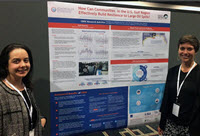
Vanessa and fellow GoMRI Scholar Jacqueline Fiore in front of a CRGC poster at the 2017 Gulf of Mexico Oil Spill and Ecosystem Science conference. (Provided by Vanessa Parks)
Vanessa’s research focuses on the mental and physical health of Gulf Coast communities who recently suffered from a major hurricane (Katrina) and the largest oil spill in U.S history (Deepwater Horizon). She began her research with a literature review of 1,477 medical publications documenting oil spills’ known health impacts and compiled the data into a searchable, publicly available database. Her research group used this information to develop the Survey of Trauma, Resilience, and Opportunity among Neighborhoods in the Gulf (STRONG). This survey was a household-level assessment of Deepwater Horizon impacts on social, economic, and health indices for coastal counties and parishes in Texas, Louisiana, Mississippi, Alabama, and Florida. Vanessa also prepared a detailed guide to assist researchers when utilizing the survey data, including narrative information and relevant citations.
Vanessa and her team compiled STRONG survey data collected from approximately 2,500 Gulf residents. She is analyzing the survey data to investigate how factors such as occupation and community relationships contribute to the way a disaster impacts a person’s health, particularly mental health. The results of her research will help health care providers, community leaders, and policy makers make informed decisions to improve health-related outcomes when future disasters happen.
Her Learning
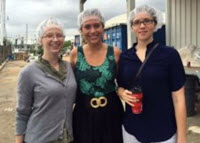
Vanessa (center) touring a seafood processing plant in Bayou La Batre, AL, with fellow CRGC grad students, Amanda Edelman (left) and Chelsea Adams (right). (Provided by Vanessa Parks)
Vanessa’s use of medical journals for her literature review of oil spills’ health impacts introduced her to public health research methods and helped her identify how social scientists might use this knowledge. “It showed me the enormous potential of my work to inform other researchers, community leaders, and healthcare professionals,” said Vanessa.
Presenting her research at the 2017 Gulf of Mexico Oil Spill and Ecosystem Science conference was another learning opportunity for Vanessa. It was her group’s first opportunity to share the STRONG survey’s findings publicly with a broad audience. While preparing her presentation, she solicited feedback from colleagues in diverse fields and incorporated their suggestions. Despite feeling nervous, the experience improved Vanessa’s self-confidence as a researcher. “Sometimes we only want to focus on one perspective, theory, or method, but it’s extremely important to integrate others’ expertise,” she said.
Her Future
Vanessa intends to pursue a career conducting applied interdisciplinary research and work with needs-based research projects addressing disparities in health and well-being. She advises students considering a career in science to be flexible and open to new opportunities. “[Conducting Ph.D. research in Baton Rouge while working with an epidemiologist in Washington, D.C.] may seem like an unconventional arrangement, but it provided me with opportunities I couldn’t have expected,” she said.
Praise for Vanessa
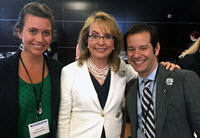
Vanessa (left) with Ramchand and Congresswoman Gabby Giffords (center). (Photo by Rajeev Ramchand)
Ramchand describes Vanessa as “an intelligent, well-poised, and articulate graduate student.” He explained that she is not only a thoughtful and hard-working researcher but also a supportive mentor and colleague, accompanying Ramchand to the launch of Congresswoman Gabby Giffords’ “Veterans for Responsible Solutions” initiative. Vanessa’s presentation at the 2017 Gulf of Mexico Oil Spill and Ecosystem Science conference exceeded Ramchand’s expectations for a graduate student and was on par with that of a seasoned researcher. “I am confident that she will continue to conduct thoughtful, important, practical, and informative research that will improve community resilience after disasters. I look forward to learning more from her,” he concluded.
The GoMRI community embraces bright and dedicated students like Vanessa Parks and their important contributions. The GoMRI Scholars Program recognizes graduate students whose work focuses on GoMRI-funded projects and builds community for the next generation of ocean science professionals. Visit the CRGC website to learn more about their work.
************
The Gulf of Mexico Research Initiative (GoMRI) is a 10-year independent research program established to study the effect, and the potential associated impact, of hydrocarbon releases on the environment and public health, as well as to develop improved spill mitigation, oil detection, characterization and remediation technologies. An independent and academic 20-member Research Board makes the funding and research direction decisions to ensure the intellectual quality, effectiveness and academic independence of the GoMRI research. All research data, findings and publications will be made publicly available. The program was established through a $500 million financial commitment from BP. For more information, visit http://gulfresearchinitiative.org/.
© Copyright 2010- 2017 Gulf of Mexico Research Initiative (GoMRI) – All Rights Reserved. Redistribution is encouraged with acknowledgement to the Gulf of Mexico Research Initiative (GoMRI). Please credit images and/or videos as done in each article. Questions? Contact web-content editor Nilde “Maggie” Dannreuther, Northern Gulf Institute, Mississippi State University (maggied@ngi.msstate.edu).
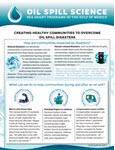

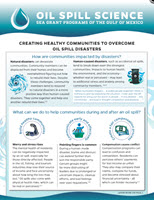
 Megha Patel is a social work Ph.D. student at Tulane University and a member of the Consortium for Resilient Gulf Communities (CRGC)’s Community Action Planning and Resilience Building efforts.
Megha Patel is a social work Ph.D. student at Tulane University and a member of the Consortium for Resilient Gulf Communities (CRGC)’s Community Action Planning and Resilience Building efforts.




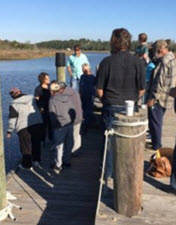 Approximately 15 local fishermen and their families attended the workshop to meet the scientists and voice their concern about topics such as sediment and marine snow. The fishermen also learned how to use the YSI ProDSSII conductivity/temperature-depth meter (CTD) to collect depth salinity and temperature profiles. They will continue collecting and returning data through the end of the project.
Approximately 15 local fishermen and their families attended the workshop to meet the scientists and voice their concern about topics such as sediment and marine snow. The fishermen also learned how to use the YSI ProDSSII conductivity/temperature-depth meter (CTD) to collect depth salinity and temperature profiles. They will continue collecting and returning data through the end of the project.
